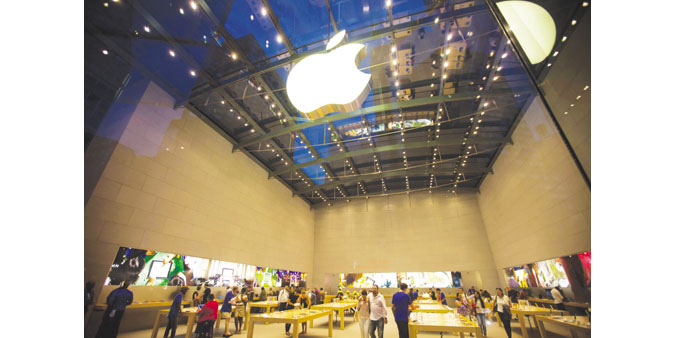Shoppers look at products at the Upper West Side Apple Store in New York. A handful of former workers who sued Apple two years ago seek a few dollars a day for time spent having their bags and electronic devices searched at meal breaks and after their shifts.
Bloomberg/San Francisco
Apple chief executive officer Tim Cook personally fielded at least one Apple Store employee complaint about “demoralising” security searches. Adding 12,000 more may give him a reason to worry about the company’s reputation.
A handful of former workers who sued the company two years ago seek a few dollars a day for time spent having their bags and electronic devices searched at meal breaks and after their shifts.
They’re asking a judge to let them add more than 12,400 former colleagues from 52 stores throughout California to the lawsuit to put the world’s most valuable technology company on trial over its treatment of a staff known for almost cult-like loyalty.
The case will become a “thorn” in Apple’s side if the workers win class-action status, said Michael Risch, a law professor at Villanova University School of Law in Pennsylvania.
“I assume they would take a $75mn hit plus bad publicity seriously,” Risch said in an e-mail. “Chump change for Apple, but nothing to sneeze at.”
The last big employment lawsuit Apple faced was resolved ahead of trial after a judge granted group status to thousands of former employees to pursue claims that the iPhone maker, Google and other Silicon Valley technology giants conspired to drive down wages by not hiring each other’s employees. That $415mn settlement comes before a judge this month for final approval.
The evidence in that case featured e-mails describing how Apple’s co-founder and then CEO Steve Jobs, who died in 2011, pulled the strings of technology executives to keep employees from jumping ship and making more money.
The security screening case also has exposed potentially damaging e-mails, including some among executives that show the company was uneasy with the policy.
A subject of particular ire in complaints to managers were cards the company issued requiring the listed serial numbers of Apple devices workers carry into the stores. When they leave, employees are required to prove to managers that the numbers on the card match those on their devices, and are then subjected to bag searches, according to a court filing.
In a 2012 e-mail to Cook labeled “Fearless Feedback,” an unidentified Apple Store employee described the searches in front of customers as “demoralising.”
“Managers are required to treat ‘valued’ employees as criminals,” the worker wrote.
Cook forwarded the message the same day to two executives, asking: “Is this true?”
The US Supreme Court ruled last year that workers don’t have a federal right to be paid for time spent in post-shift security searches, unanimously rejecting claims by former Amazon.com warehouse workers. That decision left an opening for the Apple workers to pursue their case under California law.
US District Judge William Alsup in San Francisco last year rejected Apple’s bid to throw out the case, ruling that a “more comprehensive” airing of evidence was required.
The workers’ bid for class-action status may put the company on the hook for compensation for every Apple Store employee over a six-year period who wasn’t paid for the minutes they submitted to screenings each day. For 12,000 employees deprived of 15 minutes pay at a minimum wage of $9 an hour, that amounts to about about $60mn, according to Risch. Apple could also be hit with another $15mn in penalties, he said.
The workers are pushing for a jury to decide whether they’re entitled to lost pay. Calculating damages for such a large class of workers would require “mini-trials” for each one, Risch said, adding that the court proceedings alone would cost Apple “a fortune.”
At a hearing on Thursday, Apple argued that the workers aren’t entitled to class status because there are too many variables in how different stores apply the screening policy. The company cited a 2011 US Supreme Court ruling that blocked thousands of women from pursuing gender discrimination claims as a group against Wal-Mart Stores
Josh Rosenstock, a spokesman for Apple, declined to comment on Thursday’s hearing or whether the screening policy is still in place.
If Alsup sides with the workers, Apple will probably settle the case rather than risk a trial, said Orly Lobel, a law professor at University of San Diego who specialises in labour and employment issues.
“I don’t see it as a ‘threat’ to Apple in the larger scheme of things but certainly if class is certified it would likely end in some settlement and Apple would have to change some of its calculations of wage and hour pay to certain categories of employees,” Lobel said.
In the e-mail to Cook three years ago, the Apple Store worker said besides being offensive, the security searches were probably useless.
If an employee wants to steal an Apple device, “I am sure they would be smart enough not to show that stolen device and its non-matching serial number when asked to show their device card,” the worker wrote. “I think they would also be smart enough not to hide their stolen device in their bags.”

